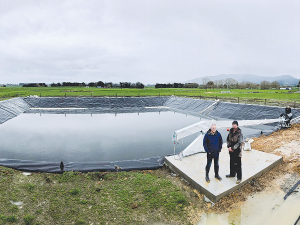Waikato dairy effluent breaches lead to $108,000 in fines
Two farmers and two farming companies were recently convicted and fined a total of $108,000 for environmental offending.
 Tainui Group Holdings primary industries manager Mark Jackways (left) and Tainui Road Dairy manager Greg Boswell and an effluent storage pond on the farm.
Tainui Group Holdings primary industries manager Mark Jackways (left) and Tainui Road Dairy manager Greg Boswell and an effluent storage pond on the farm.
Seek expert advice to understand how to meet new effluent management regulations in your region, advices Tainui Group Holdings (TGH) primary industries manager Mark Jackways.
TGH is completing two years of effluent management improvements on three of its Waikato dairy farms.
The company's dairy farms in Waikato include Hukanui, Punawai and Tainui Rd. A fourth dairy farm, Mangatea, was already up to spec for effluent management.
Hukanui and Tainui Rd had been owned by TGH for 30 years. Mangatea and Punawai had been bought over the past two-three years. All farms supply Fonterra.
“All three of our recent upgrades had different systems such as tanks, lined ponds or unlined/sealed ponds,” said Jackways. “We wanted our effluent systems to meet compliance regulations, to reduce risk on the farms by having larger and safer storage capacity.
“We brought in experts to provide advice and help design the best and most cost effective solutions for our dairies,” Jackways said. “An additional benefit is that we’ll save on fertiliser costs, using effluent not fertiliser to irrigate larger areas of each farm.”
The Hukanui dairy is 105 ha and has 330 cows producing 120,000 kgMS/year.
Improvements included relocating and upgrading the pump and stirrer system, a new gravel trap, an extension to the area that can be irrigated and a new irrigator.
Punawai is 85 ha and has 220 cows producing 65,000 kgMS/year. The farm now has a new storage tank replacing the old “geographically challenging” pond and, like Hukanui, it also has a new gravel trap, pump and stirrer, an extended irrigation area and a new irrigator.
Tainui Rd dairy is 250 ha and has 630 cows producing 200,000 kgMS/year. This has been upgraded with a new sump and gravel trap, new pump and stirrer and a new large, lined effluent pond.
All the upgrades were designed, managed and had equipment supplied by Waikato Milking Systems, which is one third owned by TGH.
Said Jackways, “It’s been a large combined investment for all the farms, but it’s something we had to do, to be complaint and sustainable in the long term.
“We’re a long term player in the dairy industry so it’s better to get it done properly now so we don’t have to revisit the problem later. The final result means our dairies are more efficient, sustainable and environmentally friendly for the future.”
As New Zealand marks the United Nations’ International Year of the Woman Farmer 2026 (IYWF 2026), industry leaders are challenging the misconception that women only support farming.
Fonterra’s impending exit from the Australian dairy industry is a major event but the story doesn’t change too much for farmers.
Expect greater collaboration between Massey University’s school of Agriculture and Environment and Ireland’s leading agriculture university, the University College of Dublin (UCD), in the future.
A partnership between Torere Macadamias Ltd and the Riddet Institute aims to unlock value from macadamia nuts while growing the next generation of Māori agribusiness researchers.
A new partnership between Dairy Women’s Network (DWN) and NZAgbiz aims to make evidence-based calf rearing practices accessible to all farm teams.
Despite some trying circumstances recently, the cherry season looks set to emerge on top of things.